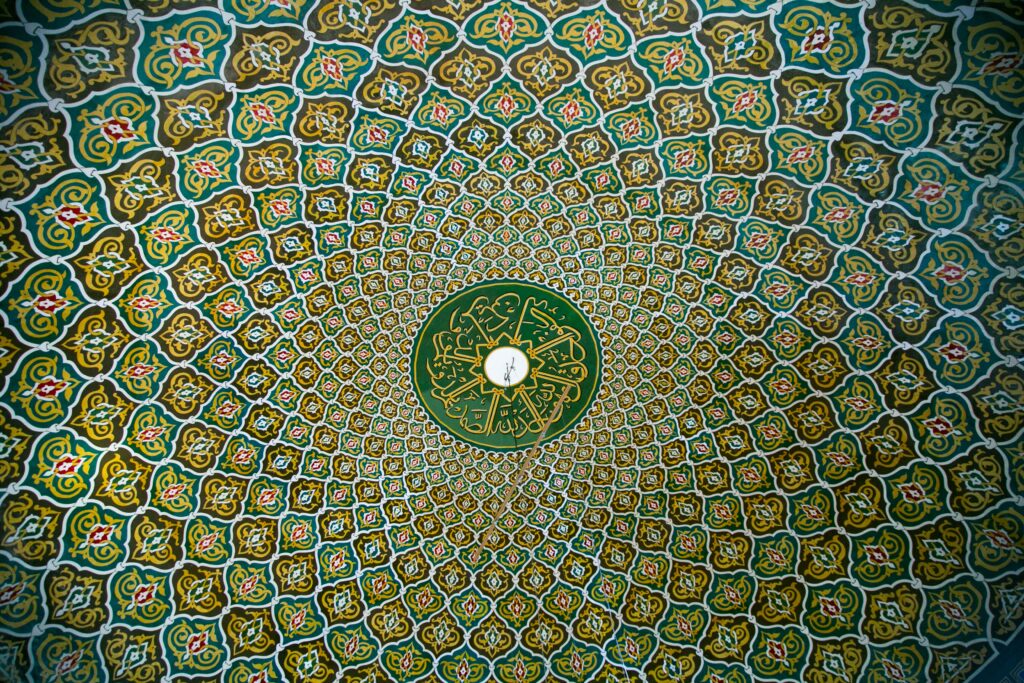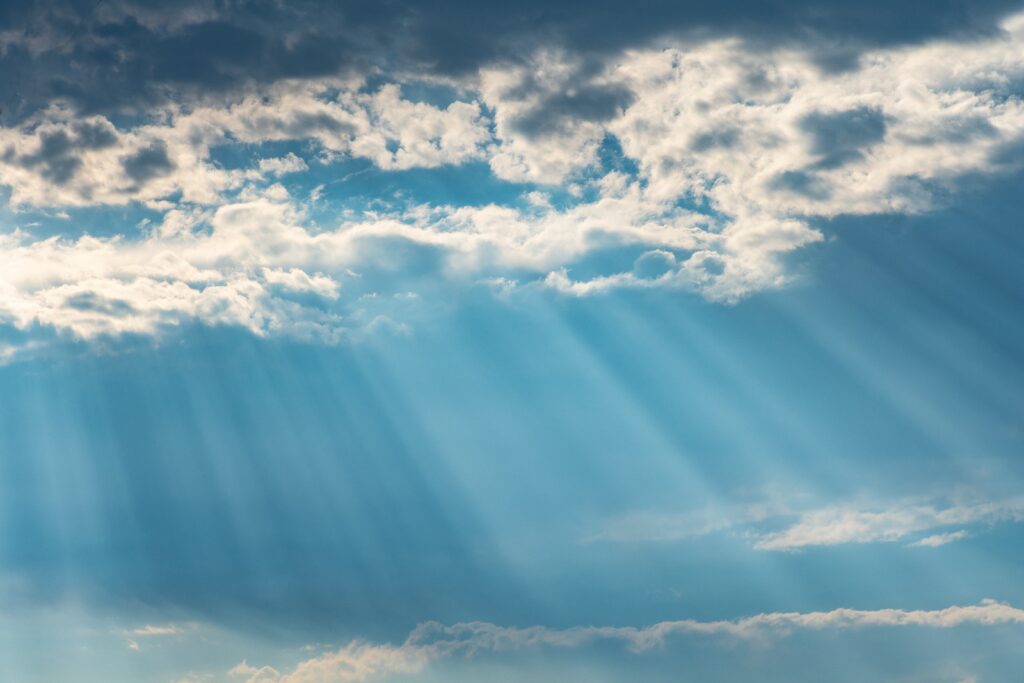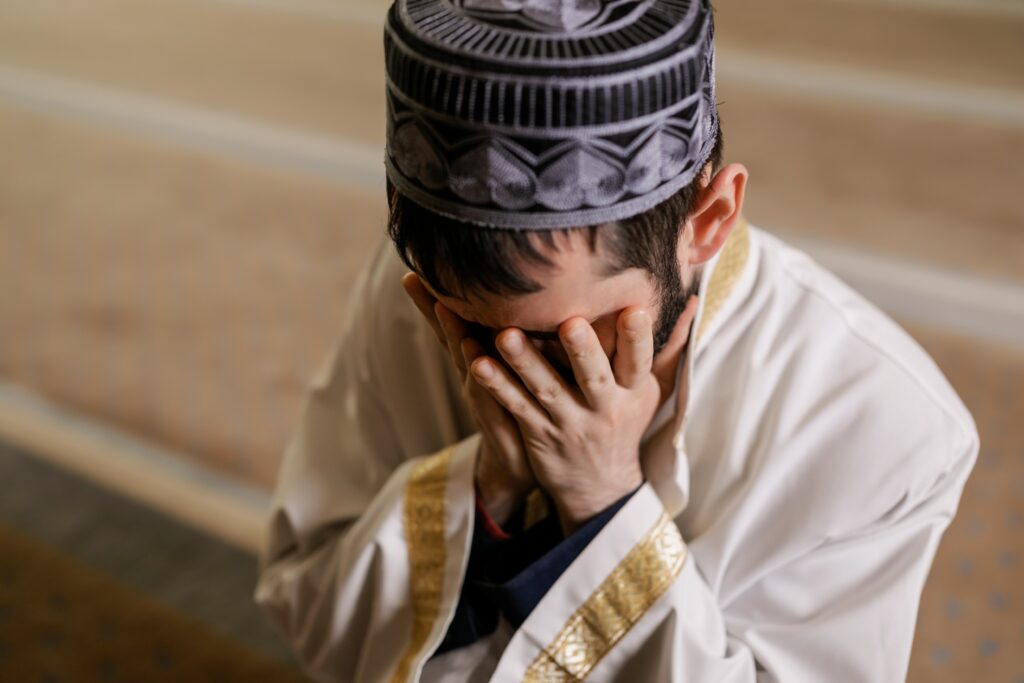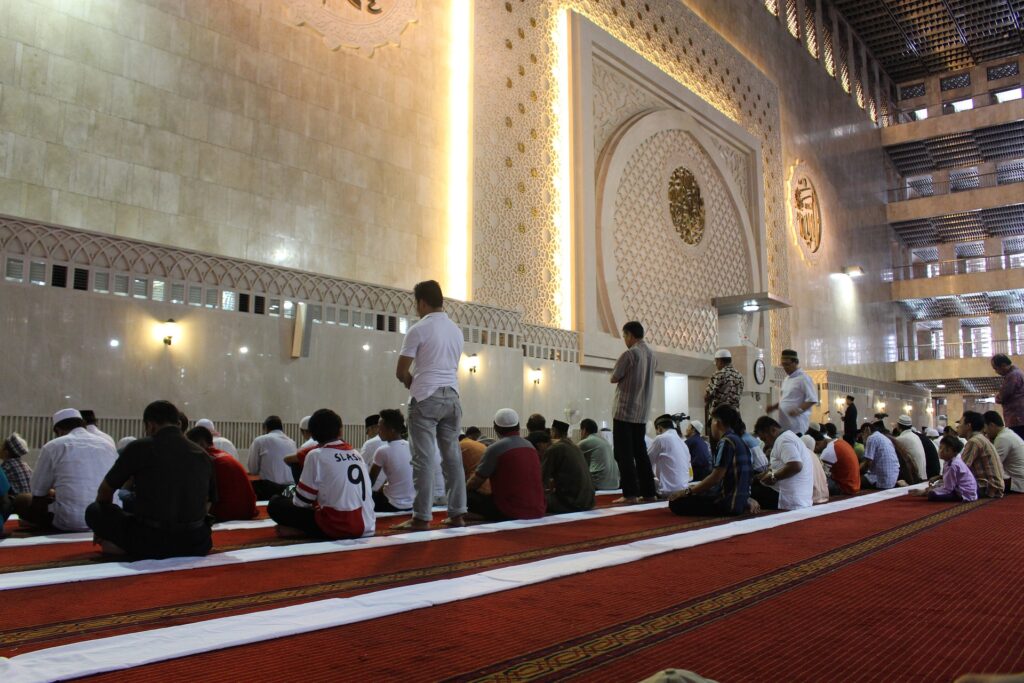Guidance regarding basic Islamic issues that Hazrat Amirul Momineen, Khalifatul Masih Vaa, has given on various occasions in his written correspondence and during MTA programmes is being published officially below for everyone’s benefit.

Nature of God, life after death, soul, hell and heaven
Someone from India sent the following questions to Hazrat Amirul Momineen, Khalifatul Masih Vaa:
1. Who is Allah and what is His nature?
2. If the universe started with the Big Bang and has been expanding on its own ever since, does that mean that the entire universe is God?
3. It is said that after we die, we go to Allah. How does this happen? What is the reality of the soul, and can it travel between different parts of the universe where heaven and hell exist? In other words, can the soul move from one place to another?
Huzoor-e-Anwaraa, in his letter dated 10 March 2022, provided the following response to these queries:
1. Nature of God
“According to Islamic teachings, in which we have complete faith, the entity that is guiding and sustaining the entire universe is the divine Being of Allah the Exalted. Therefore, when we state that everything has been created by some entity or being, it is important to acknowledge that science also recognises that nothing in the universe is self-created, but has a creator behind it. Science may refer to that entity as ‘nature’, but according to the teachings of Allah the Exalted and His messengers, we regard that entity as the Being of God Almighty.
“Furthermore, it is essential to acknowledge that God Almighty’s infinite Being transcends human comprehension and knowledge. Our faith regarding this matter is derived from the Holy Quran, which affirms:
قُلۡ هُوَ اللّٰهُ اَحَدٌ۔ اَللّٰهُ الصَّمَدُ۔ لَمۡ يَلِدۡ وَ لَمۡ يُوۡلَدۡ۔ وَ لَمۡ يَكُنۡ لَّهٗ كُفُوًا اَحَدٌ۔
“‘Say, ‘He is Allah, the One; Allah, the Independent and Besought of all. He begets not, nor is He begotten; And there is none like unto Him.’’ (Surah al-Ikhlas, Ch. 112: V. 2-5)
“The Promised Messiahas states about the Being of Allah the Exalted:
“‘God is One in His being and His attributes and His glory. He has no partner. All are dependent upon Him. He bestows life on every particle. He is the source of grace for everything and is not in need of grace from any. He is neither a son nor a father for He has no equal and no one is like unto Him.’ (Islami Usul Ki Filasfi, Ruhani Khazain, Vol. 10, p. 417)
“‘Your God is One in His Being and in His attributes. No one is eternal and everlasting like Him, nor does anything possess attributes similar to His. Man depends upon a teacher for his knowledge, yet his knowledge remains incomplete, but God needs no teacher, for His knowledge knows no bounds.’ (Lecture Lahore, Ruhani Khazain, Vol. 20, pp. 154-155)
“‘It is not within the power of Man to comprehend all the activities of the Divine, as they are above [human] reason, intellect and imagination. A man should not be proud of his pittance of knowledge that he has to some degree comprehended the system of cause and effect, inasmuch as that knowledge of his is very limited, as if it were a millionth part of one drop out of the ocean. The truth is that as God Almighty Himself is unbounded His activities are unbounded also. It is beyond and above human power to reach the reality of every activity of God. […]
“‘We do not believe in a god whose powers are limited by our reason and speculation and there is nothing beyond. We believe in the God Whose powers, like His Being, are unlimited, unconfined, and unending.’ (Chashma-e-Ma‘rifat, Ruhani Khazain, Vol. 23, pp. 280-282)
“‘As I mentioned earlier, philosophers merely state, upon observing the heavens, the earth, and the most well-ordered, and perfectly sustained arrangements of other creations, that there must be a Creator, but I elevate this [argument] to a higher level and say, based on my personal experiences, that there is a God.’ (Malfuzat [2016], Vol. 2, p. 352)”
2. Life after death

“Your second question is about human death. So, the reality of death is that when Allah the Exalted breathes a soul into the human body at the time of birth, that soul leaves the mortal body at the time of death. And the body remains in this world, whether the person dies by drowning in water, is buried or cremated, or is exposed to predators and scavengers. And the human soul moves to the other world, which is called the world of barzakh, where it is given a new body of light or darkness according to the person’s deeds in this world.
The Promised Messiahas, while explaining the relationship between soul and body, states:
“‘Barzakh is a state in which the mortal condition of man is dissolved and the soul and the body are separated. The body is buried in a pit and the soul also falls into a sort of pit. […]
“‘On death, the soul departs from this mortal body, but in the intermediate state, every soul is invested with a body in order to enable it to react to the conditions of that state. That body is not like this physical body, but is prepared from light or from darkness, according to the quality of the person’s actions in this life, as if a man’s actions serve as a body for the soul in that state. In the Word of God, it is repeatedly mentioned that some bodies will be bright and some will be dark. They will be prepared from the light or from the darkness of human actions. This is a fine mystery but is not opposed to reason. […] Those who have some experience of the state of vision will not regard such a body as is prepared from human actions as a matter of surprise and improbability, but will duly appreciate this phenomenon.
“‘In short, this body which is acquired according to the condition of one’s actions, becomes a source of the recompense of good and evil in the intermediate state.’” (Islami Usul Ki Filasfi, Ruhani Khazain, Vol. 10, pp. 403-405)
“The Promised Messiahas refers in this passage to a type of pit in which the soul is said to fall, which is actually a reference to the following verse of Surah ‘Abasa:
ثُمَّ اَمَاتَهٗ فَاَقۡبَرَهٗ
“‘Then He causes him to die and assigns a grave to him.’ (Surah ‘Abasa, Ch.80: V.22)
“It is evident that not every human being in this world is blessed with a grave adorned with a mound of dirt, as millions of dead are cremated and not buried. Hundreds of thousands of people perish in drowning or are consumed by wild beasts. Therefore, how can it be asserted that every human being is placed by God in a grave? Here, the term ‘grave’ refers to the spiritual abode where a person’s soul is kept after death and before undergoing the perfect and final reckoning.”
3. Soul, hell and heaven

“When it comes to the question of whether a soul can move from one place to another in heaven and hell, the first thing to remember is that the soul is subject to the command of Allah Almighty and cannot act of its own free will. Therefore, when the Jews asked the Holy Prophetsa about the soul, Allah the Exalted instructed the Holy Prophetsa as follows:
قُلِ الرُّوۡحُ مِنۡ اَمۡرِ رَبِّيۡ
“‘Say, ‘The soul is by the command of my Lord.’’ (Surah Bani Isra’il, Ch.17: V.86)
“Secondly, in the Holy Quran, two words are mentioned for the records of conduct or of doings of believers and disbelievers in the hereafter: ‘sijjin’ and ‘illiyyin. Explaining the meanings of these words, Hazrat Musleh-e-Maudra stated:
“The term ‘sijjin’, used for disbelievers, is singular, while the term ‘‘illiyyin’, used for believers, is plural. This difference indicates that Allah the Exalted does not increase the punishment of the disbeliever, but continuously increases the reward of the believer. As a result, the disbeliever remains in the same prison while the believer changes his abode. Each abode is followed by one superior to it, and so on. Likewise, Allah makes the believer journey through many worlds. Hence, the houses of the believer will be many, while that of the disbeliever will be one. (Tafsir-e-Kabir, Vol. 10, pp. 311-312)
“Moreover, the Holy Quran mentions the dwellers of Paradise and the inmates of Hell, and it states that there is a barrier between them, indicating that they will not be able to meet each other. (Surah al-A‘raf, Ch.7: V.47)
“When it comes to the matter of intermingling among people of different levels in Paradise, the Quran and Hadith mention the various places and levels within Paradise, but no hindrance to interaction and mingling among the dwellers of these different levels is mentioned. In fact, Allah Almighty affirms in the Holy Quran that, those who believe and whose children follow them in faith — with them shall We join their children in the highest levels of Paradise. We will also not diminish anything from the good deeds of their fathers and forefathers. (Surah at-Tur, Ch.52: V.22)
“Based on these Quranic ideas, it is evident that righteous souls, with the permission of Allah the Exalted, will have the ability to move from one place to another and meet one another. However, the evil souls who are serving their punishment in Hell will remain confined in their prison until their sentence is completed. Once their sentence is over, they too will be granted mercy by Allah the Exalted and will be able to enter Paradise.”
Medication during Ramadan

A doctor from the UK asked Hazrat Amirul Momineen, Khalifatul Masih Vaa about the use of treatment methods such as hormone patches, contraceptive implants, hormone depot injections, pain relief gels, deep freeze, and deep heat during fasting. Huzoor-e-Anwaraa, in his letter dated 21 March 2022, provided the following instructions in this regard.
“During the use of any medical treatment, while fasting, it is very important to keep in mind some fundamental principles. The first and foremost thing is that Allah the Almighty has commanded the sick and travellers that they should not observe fast in the state of illness or travel, and should complete the missed fasts after the recovery from illness or completion of the journey. And if a person is suffering from a chronic illness and has no hope of getting better, then in such a situation, if he is able to afford it, he should offer fidyah. (Surah al-Baqarah, Ch.2: V.185)
“However, if someone is experiencing a health condition that medical experts have confirmed will not be harmful if they fast, then they are allowed to fast even in that state.
“If such a medical condition requires the use of medication, the medicine should only be taken before starting the fast or after breaking it. During the fast, no medication should be taken that enters the body. However, if the medicine is only applied to the skin and does not enter the body, such as an ointment, cream, gel, or spray, then it is permissible to use it during the fast.
“A medication that is administered through surgery or injection and slowly releases into the body, cannot be injected during fasting as is also the case with regular medicines or food and drink items. It can only be administered into the body before starting the fast or after breaking it. It is not permissible to inject such medication during fasting.”
Plastic caps, provided at the mosque

A mu‘allim wrote to Hazrat Amirul Momineen, Khalifatul Masih Vaa, asking whether it is an innovation and an undesirable practice to wear plastic caps and other similar headwear – provided at mosques – and to pray while wearing them. Moreover, the mu‘allim asked whether it is appropriate to perform the sunnah prayer at Fajr while the dars of the Holy Quran is being delivered, since Allah the Exalted says in the Holy Quran that one should listen to the Holy Quran with attention and observe silence when it is recited. Huzoor-e-Anwaraa, in his letter dated 28 March 2022, provided the following answer to his questions.
“As far as possible, one should wear appropriate and clean clothes when going to the mosque, as Allah has commanded us to look to our adornment at every mosque. (Surah al-A‘raf, Ch.7: V.32) In this directive, in addition to spiritual purity of the heart, outward cleanliness of clothes and body is also included. Therefore, as far as possible, appropriate attire should be worn when visiting mosques, and this includes covering the head. Throughout the history of Islam, it has been a common practice of the elders of the Ummah to cover their heads with an ‘imamah, turban, or cap. It is also narrated in the hadiths from various companions that the Holy Prophetsa used to wear an ‘imamah.
“Hence, Jabir bin Abdullah al-Ansarira reported that Allah’s Messengersa entered Mecca [and Qutaiba (another narrator) stated that he entered Mecca] on the Day of the Victory, wearing a black turban. Likewise, Amr bin Huraith reported [on the authority of his father] that Allah’s Messengersa addressed the people while wearing a black turban on his head. (Sahih al-Bukhari, Kitab al-hajj, Bab jawazi dukhuli makkata bi-ghayri ihram)
“Thus, keeping some clean plastic or cloth caps in the mosque would not seem to pose any issue if worshippers wish to use them, but rather it could be considered a good practice, as it would be equivalent to promoting [the wearing of caps]. Some people prefer not to pray bare-headed, and if they are provided with such a cap in the mosque, they would happily wear it and pray. However, it is important to note that no one should be compelled to pray while wearing those particular caps.
“If someone wants to wear these particular caps, provided in the mosque, willingly and happily, then they should not be stopped, and if someone does not want to wear them, then they should not be forced [to wear those particular caps].”
Offering sunnah prayer during a dars or a sermon

“As far as your second question is concerned, there is no prohibition against performing sunnah prayer during dars. Ahadith mention that mosques are for the remembrance of Allah the Exalted, prayer, and recitation of the Holy Quran. (Sahih Muslim, Kitab al-taharah, Bab wujubi ghusli l-bawli wa ghayrihi min an-najasati idha hasalat fi l-masjid)
“Thus, all of these activities can be performed simultaneously in mosques, with some people offering nawafil, others reciting the Holy Quran, and still others engaging in zikr. However, in such cases, it is important to heed the advice of the Holy Prophetsa to be considerate of each other and avoid reciting louder than others in the mosque. (Muwatta Imam Malik, Kitab an-nida’ li s-salah, Bab al-‘amail fi l-qira’ah)
“In addition to that, it is also narrated in ahadith that after completing the salaam of salat, the Holy Prophetsa would usually turn his blessed face towards the Companions. At this moment, sometimes he would also preach to them i.e., advise them. After the Fajr prayer, he would also instruct the people to share any dreams they may have had during the previous night. (Sahih al-Bukhari, Kitab al-adhan, Bab yastaqbilu l-imamu n-nisa’a idha sallama & Kitab al-jana’iz, Bab ma qila fi awladi l-mushrikin; Sunan ibn Majah, al-Muqaddimah, Bab ittiba‘i s-sunnati l-khulafa’i r-rashidina l-mahdiyyin)
“Another hadith mentions that the Holy Prophetsa instructed that whoever comes to the mosque on Friday while the imam is delivering the sermon, should pray two brief rak‘ahs first, then sit and listen to the sermon. (Sahih Muslim, Kitab al-jumu‘ah, Bab at-tahiyyati wa l-imamu yakhtubu)
“All of these ahadith indicate that there is no harm in performing the sunnah prayer while the imam is delivering a khutbah. This is because if it were not so, the Holy Prophetsa would not have commanded the person who came late for Jumua to pray two rak‘ahs before listening to the khutbah. Similarly, if a person performs the sunnah prayer during a dars, this is also not objectionable because it is necessary to perform the sunnah prayer immediately after the congregational salat, but it is not compulsory to listen to the dars. Especially, after the Fajr prayer, when there is little time and there is concern about the sunrise, one should perform the sunnah prayer immediately.
“As far as the administrative aspect of this matter is concerned, in my opinion, if the dars is being delivered after a salat which also includes sunnah after the prayer, such as Zuhr, Maghrib, or Isha, then the dars should be delivered after the performance of the sunnah prayer. However, if there is no sunnah prayer in that salat, then the dars can be started immediately after the salat. In that case, if a person performs the first two sunnah of Fajr after the fard prayer [on account of his being late], he can also perform them during the dars.”
(Compiled by Zaheer Ahmad Khan, Head of Records Department, Private Secretariat, London. Translated by Al Hakam.)

